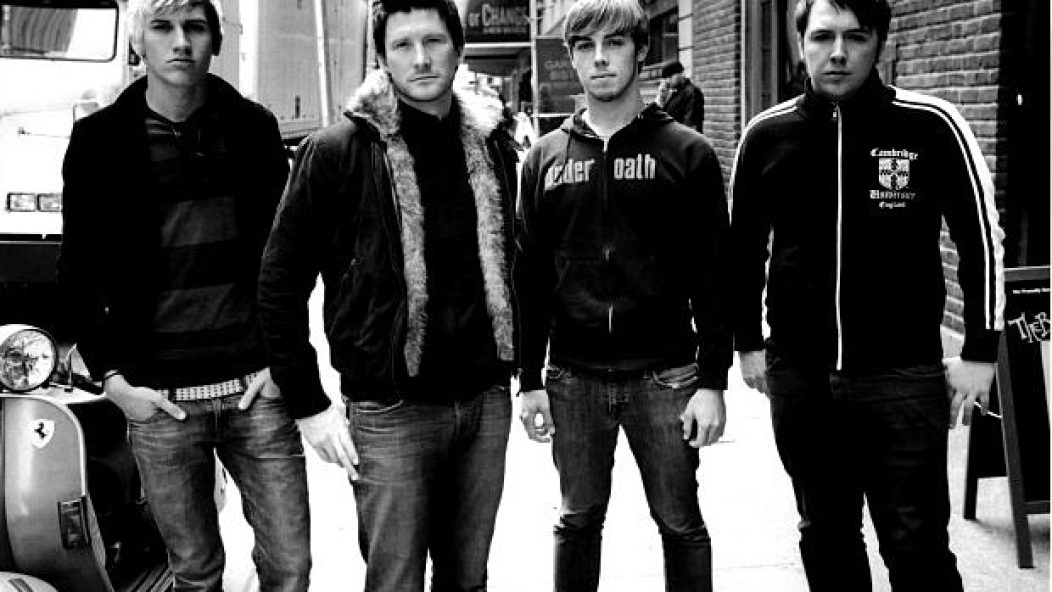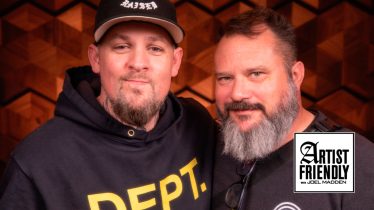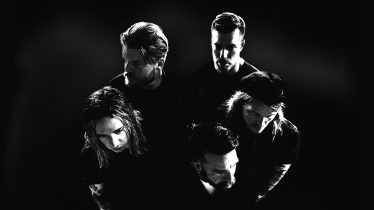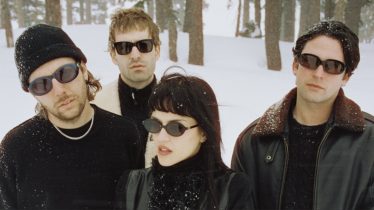
Anberlin tell the story of “The Feel Good Drag”
In this recurring column, we pull back the curtain on the making of your favorite songs, taking a retrospective look at the bands who wrote them. In this installment, Brian Kraus spoke with Anberlin bassist Deon Rexroat about their rock radio hit, “Feel Good Drag.”
ANBERLIN
“Feel Good Drag”
FROM: Never Take Friendship Personal (Tooth & Nail, 2005) and New Surrender (Universal, 2008)
Anberlin’s second album, 2005’s Never Take Friendship Personal, first featured the song, anchored at the deep end of the track listing. Still missing vocals late in the recording process, “Feel Good Drag” nearly missed the boat for NTFP (more on that later). During its initial run, the song’s darker, post-grunge pull was overshadowed by the record’s more timely pop-punk offerings. After the band released 2007's Cities, they signed with a major (Universal Records), and re-recorded “The Feel Good Drag” (as well as shortened the title to “Feel Good Drag”) for 2008's New Surrender to give it the shot they felt it deserved. Some diehard fans talked smack, but the band knew best. The song would eventually explode across radio and TV airwaves, becoming a smash single and a long-held dream realized.
“[People] just assumed that because we signed to a major, we were forced to re-release an old song and push to be on the radio. It was actually for us. It was more about doing justice to an old song, and radio was opening a door that we had never had a chance to fully take advantage of before,” says Rexroat. “We got accused of a lot of things around that time. I think our real fans knew the difference and stuck with us. There were a few people (even on our final tour) that would tell us, 'We stopped listening to you around New Surrender because you guys went so commercial.' It's like, 'Did we really go commercial? Because there was nothing on the radio that sounded like it.'”
Did the success of “Feel Good Drag” surprise you, or did you think the major label backing gave it a sure shot?
DEON REXROAT: I think the thing that surprised us most is when we got done recording New Surrender, and the label wanted it as a single. We were like, “Cool!” The thing that surprised us about the success was that we had actually stopped playing “Feel Good Drag” live in the set by probably 2006, about a year after Never Take Friendship Personal came out, because it just wasn't getting a good response live. It's kind of funny in that way, a song that people just weren't into previously had grown into being this fan-favorite when we re-released it. It had legs on it to open us to a new audience. That was actually really surprising.
When it was released on Never Take Friendship Personal, you would say the fans weren't really gravitating towards it as much? on a smaller scale?
There were other songs initially, songs like “Paperthin Hymn,” “Day Late Friend” and obviously the title track they gravitated to. It was just one of those things where Drag was an album track, at the time. That album became what it became: a fan-favorite. The songs that were on that album became more special to people over time. So in the three to four years after it had been released, that song sat with people and became to resonate more and more. More than it did initially.
On his lyrics blog, Stephen Christian also mentioned it “wasn't even supposed to go on the record.” Can you elaborate on that? Did that have anything to do with its alternative rock direction compared to catchier pop-punk fare on the record?
Actually, musically it was one of the first songs we recorded [for NTFP]. Well, one of the first songs we tracked drums to. Nate had it down and knew exactly what he wanted to play. When you track an album, just to get warmed up, you kind of start with the easier songs or the songs you sat with for a while. We had that one written for a long time, but Stephen still didn't have lyrics and melodies he was happy with. So, it got down to the deadline of the album and that one moved up the ladder a little bit.
We actually had to fly him back in to finish vocals for that because he ran out of time. Another band needed studio space, so we had to skip a week and then come back. It's funny, because for a song that we had nothing for, on the flight back out to record it, he finally wrote something he was happy with. That's what he ended up recording and it came out the way it did. It worked out, as far as I'm concerned.
If you listen to the song, there's not really backing vocals or anything, because we didn't really finish the song. The song is as it is; he did the lead vocals. It's just kind of bare bones that way because we ran out of time. We didn't get to do everything we wanted to the song, but it worked out, I think it sounds better that way.
Was picking a song to redo and push on your major release challenging, given three LPs to choose from, or was “FGD” the clear choice? Did you want to give it another shot?
Yeah, it was basically that. We just wanted to give that specific song another shot. It had nothing to do with trying to rehash old material. We had twenty-something songs written for New Surrender. For us, because like I said, it was an unfinished song in a way, we wanted to record and finish it the way we envisioned. It proved to be a really strong song just as it did before the second time around. For us at that time, it became a thing like, “Well, we're entering this new territory with a major label, and being heavily pushed to radio because of that.” It was about bringing the old in with the new. that piece of what made us who we were for those first three albums, and also introduced ourselves to a whole new crowd, taking advantage of that whole new medium that we were being offered.
Do you remember why there was some “scene dissent” when you re-released the song? Very little was changed, right? Stephen also talks about this on his blog, and in retrospect, was very vindicated about it.
The way we recorded it the second time around was actually the way we had grown to play it live in the two or three years. A Catch-22 of recording albums is that you always think of better stuff to do later, or you always get comfortable with the song after the fact. For me, musically I would choose the second version because it's more cohesive as a song. Nate was able to think out his drum tracks. The guitar solo blows the first one away. [Laughs.] We had grown with the song and made it more our own than we had originally.
A lot of that dissent came from the old guard having to coexist with the new guard of fans. It was s song that people felt was theirs that they had discovered before all these other people. They had thought that we had redone it to become a commercial success, which couldn't be further from the truth. First of all, the song was almost a dud on the radio for a year straight. It just sat there, it was getting play here and there, but it wasn't by any means a hit. Then all of a sudden it clicked out of nowhere. In a matter of a month, it went from the bottom of the charts to the Top 20. We had no idea. Our label was ready for us to release another single.
You discover something on your own before a lot of people and you get possessive over it. That was their special song, and then it became a successful song with a different recording. People had thought that we had watered it down because there was no screaming, which is funny. There's really only screaming in one part of the song, and it's like one word. It's all the little things that not a lot of people know; you can tell them endlessly, but they're always going to say we sold out or whatever.
We were opening for 30 Seconds To Mars a couple years ago, and we were playing in this basketball arena. You could get back in the chairs and tilt your head around the curtain to backstage. We were on the side stage, about to go on, a kid looks around and says, “Can you play the good version of 'FGD'?” and we were like, “What?!” We don't even know what that means! We're going to play it good, we're going to play it well, if that's what you mean. We don't know what “play the good version of that song” means, because to us, we didn't change anything other than we played it [on the recording] the way we'd always been playing it live.
It's just weird. You can't expect everybody to be on board with your choices. We made the choice that was right for us, which is pretty much what we tried to do for our whole career. It worked out, for the most part. I have no regrets on that end.
Take us back to that moment when it became a hit.
Like I said, it was almost overnight. I remember in—probably in summer of 2009—we were on tour with Taking Back Sunday and we were starting the tour in Cleveland, Ohio. We did some rehearsals in Nashville, Tennessee, where Stephen had moved to at that point. I vividly remember rehearsing and waking up the next morning, the day before we were supposed to be leaving for tour, for a conference call with our manager. We're going over the options for the next single. The label had lost faith in Drag. They don't think it's going to go anywhere—just hover around the same position. So we looked over our options. We had recorded this cover of New Order's “True Faith,” things like that. We were kind of scrambling at that point. One of the worst things to hear since you sign to a major label is that they're losing faith in a song. [Laughs.] They're the ones that control your destiny at that point. You relinquish that control more than you do when you're on an independent label.
So, we do the TBS tour, and then we flew out to do KROQ Backyard Barbeque. We had a couple people that liked us, but we weren't being embraced by program directors across the country. Maybe two or three months after that tour, all of a sudden we start getting calls. “Feel Good Drag” has now reached the Top 50, Top 40. It's reached the Top 20. It was like jumping ten positions weekly. We're looking at the charts and looking at bands like Green Day, Metallica and Rise Against and flying past the bands we grew up listening to. It was just mind blowing. People are calling specifically to hear our song, and they want to hear them more than these other songs enough that the radio stations are playing our song more. We almost couldn't keep up!
We're just sitting there trying to tour and promote New Surrender: meanwhile we have this whole thing happening that we never had before. We were used to, people heard our songs was playing a show, they liked us and maybe they bought the album. Now, we have this thing where people were hearing us ten times a day on the radio. [Laughs.] It was almost like having this doppelganger Anberlin out there working around the clock. It was really surreal, to be honest. It really did move us into a different bracket of a band.
Stephen has credited “FGD” with prolonging your career. Had it not done anything, how do you think Anberlin history would or would not have been changed?
I think it prolonged our career as far as being on a major label, for sure. You don't really get that many strikes when you're on a major. You don't get three strikes; more like after the first swing, you're done. We saw it happen to a lot of bands before and after signing to Universal. I remember specifically in the early '00s, bands like Saves The Day and the Get Up Kids, that whole emo scene was rising as a contender in the mainstream. Major labels were snatching up those bands left and right. “Oh, this Drive-Thru Records band did well, so let's sign two more of these Drive-Thru Records bands!” You saw a lot of bands put out albums and then go nowhere. They started to make a lot of noise independently, and then signing to a major was like a death sentence for them. I always respected STD and TGUK for not jumping straight to a major label, but just making a lateral move to a stronger indie label. That saved them, in a sense. We probably wouldn't have gotten Stay What You Are or Something To Write Home About if those bands had signed to major labels too early on.
For us, the fact that “FGD” did well, it made us able to truly progress naturally as we had hoped. It didn't become a big enough hit where it became a monster for us. It was to us since we never experienced anything like that before, but it's not like we went into the stratospheres of multi-platinum selling artists. It gave us that little bit of leverage with the label the next time around to be like, “No, we want to do this.” I think it prolonged our career on Universal, absolutely. Had we been dropped after New Surrender, I don't think it would have taken the wind out of our sails and we would have quit, by any means. But I do think it allowed us to keep moving in the direction that we had been going in for years.
After it became mandatory to play “FGD” at every show, did you ever get sick of it?
No, even after the final tour we did last year, I looked forward to playing that song every night. Even songs that I didn't initially like when we recorded them, if the crowd was on board, it made them so much fun to play live every night. You feel that energy. It's why you play music. It reminds me what I love about music: Everybody connects in the audience at that point. We're all feeling the same emotions. I never got tired of playing it because of that. The song was a high point in the set every single night.
I think finally getting the unabridged story behind “FGD” is going to be a trip for some people.
Sometimes as music fans, we put our own stories on things. We read into something, or maybe we piece bits and pieces together that may not even be relevant to each other and make up our own stories on why something happened in a band's career, or what affected this timeline and trajectory of the band. What made them make a decision, you know?
For a lot of people, they just assumed that because we signed to a major, we were forced to re-release an old song and push to be on the radio. It was actually for us. It was more about doing justice to an old song, and radio was opening a door that we had never had a chance to fully take advantage of before. We got accused of a lot of things around that time. I think our real fans knew the difference and stuck with us. There were a few people—even on our final tour—that would tell us, “We stopped listening to you around New Surrender because you guys went so commercial.” It's like, “Did we really go commercial? Because there was nothing on the radio that sounded like 'Drag.'”
When I was preparing for this interview, I read a few other BackTracking stories, one of which was Jimmy Eat World's “The Middle.” Jim Adkins said, “I don't know how we fit into what's going on in the radio.” He lists the bands that were being played around that time with JEW and I agreed. I was a huge fan when Bleed American came out because of Clarity. I would have never said they sold out. It's not like they were copying anybody. They got to where they were for the reasons that I love them. They were a really good band that wrote songs that connected with people.
I hope that's what happened for us and not that we compromised any beliefs or ideals that we had. I feel like that's what happened for us. We were the same band in 2008 with New Surrender as we were in 2007 when Cities came out. The label changed nothing for us; it just made the playing field bigger. ALT







